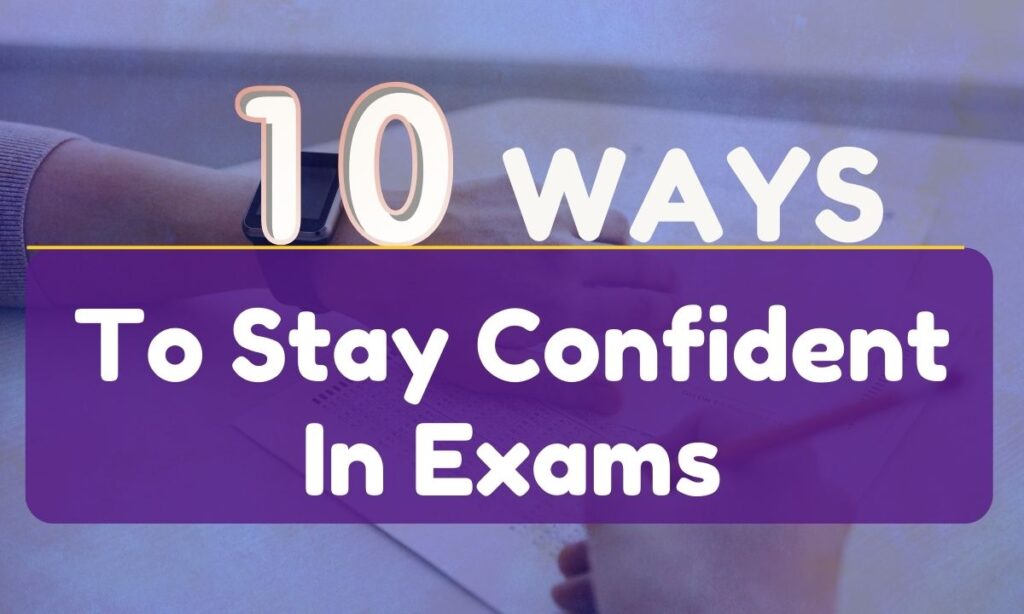Are you feeling anxious about exams? Wondering how to maintain your confidence throughout the testing period? Stay confident in exams by mastering a few key strategies.
In short, staying confident in exams requires proper preparation, positive self-talk, and effective time management. By adopting these practices, you can tackle any exam with confidence and perform at your best.
But these are just the beginning steps to exam success. In our upcoming article, we’ll delve deeper into specific techniques and tips endorsed by renowned educators and academic experts. Stay tuned to discover how you can conquer exam anxiety and excel in your academic endeavors.
Why it is important to Stay Confident In Exams?
Staying confident during exams is crucial because it helps manage stress and anxiety levels. Confidence can lead to better concentration and the ability to recall information more efficiently. It also encourages a positive outlook, which can improve performance and assist in making informed decisions when faced with difficult questions. Ultimately, maintaining self-assurance can significantly impact the outcome of an exam.
Top 10 Ways To Stay Confident In Exams
Staying confident in exams is a skill that can dramatically influence your performance and results. Confidence minimizes anxiety, boosts your ability to recall information, and helps you handle difficult questions with poise. Below, we will explore the top 10 strategies to ensure you stay confident in exams, empowering you to showcase your abilities to the fullest. Whether it’s developing a study plan or mastering the art of positive thinking, these tips will prepare your mind and spirit for the challenges ahead.

Let’s delve deeper into each of the top 10 scientifically-backed ways to stay confident during exams
1. Practice Visualization Techniques
Visualization involves mentally rehearsing successful exam scenarios. By vividly imagining yourself confidently answering questions, remaining calm, and achieving your desired outcome, you prime your brain for success. Scientific research suggests that visualization activates neural pathways associated with performance, improving confidence and reducing anxiety.
2. Maintain a Healthy Lifestyle
Regular exercise, sufficient sleep, and a balanced diet are essential components of a healthy lifestyle that positively impact cognitive function and emotional well-being. Exercise increases blood flow to the brain, promoting alertness and concentration. Quality sleep enhances memory consolidation and emotional regulation, reducing stress and promoting clarity of thought. A balanced diet rich in nutrients fuels brain function, supporting optimal cognitive performance during exams.
3. Adopt Effective Study Strategies
Effective study strategies such as spaced repetition, active recall, and summarization optimize learning and retention. Spaced repetition involves reviewing information at intervals to reinforce memory. Active recall involves actively retrieving information from memory, which strengthens neural connections. Summarization encourages synthesizing and organizing information, facilitating understanding and retention. These scientifically-proven techniques enhance confidence by improving mastery of the exam material.
4. Engage in Positive Self-Talk
Positive self-talk involves replacing negative thoughts with affirming and encouraging statements. Research indicates that self-affirmation reduces stress and enhances performance by boosting confidence and resilience. By affirming your abilities, acknowledging your efforts, and maintaining a positive mindset, you cultivate self-belief and confidence in your exam preparation.
5. Break Tasks into Manageable Chunks
Breaking down exam preparation tasks into smaller, manageable segments alleviates feelings of overwhelm and enhances confidence. This approach, known as chunking, allows you to focus on one task at a time, making progress and building momentum. By systematically tackling each component of exam preparation, you build confidence in your ability to handle the material effectively.
Sample Question Pack NCLEX Sample Questions
6. Utilize Relaxation Techniques
Relaxation techniques such as deep breathing, progressive muscle relaxation, and mindfulness meditation are effective strategies for managing exam anxiety. These techniques activate the parasympathetic nervous system, promoting relaxation and reducing physiological arousal. By practicing relaxation techniques regularly, you develop the ability to remain calm and composed during exams, enhancing confidence in your ability to cope with stress.
Preparing For NCLEX? Read Best Way To Study For NCLEX
7. Seek Social Support
Seeking social support from peers, instructors, or mentors provides emotional validation and encouragement. Research suggests that social support buffers the negative effects of stress, fostering resilience and enhancing confidence. By connecting with others who share your academic goals, you gain perspective, insights, and encouragement, bolstering your confidence in your ability to succeed.
8. Set Realistic Goals
Setting realistic and achievable goals is essential for maintaining motivation and confidence during exam preparation. By breaking down long-term goals into smaller, measurable milestones, you create a sense of progress and achievement. Attaining these milestones reinforces your belief in your abilities and boosts confidence. Additionally, setting realistic goals helps manage expectations and reduces the pressure associated with exams.
9. Focus on Past Successes
Reflecting on past achievements and successes provides a confidence boost during exam preparation. By reminding yourself of previous accomplishments, whether academic or personal, you reinforce your belief in your abilities and resilience. This positive self-reflection cultivates a sense of self-efficacy, enhancing confidence in your capacity to overcome challenges and succeed in exams.
10. Practice Mindfulness and Acceptance
Mindfulness involves being present in the moment and accepting thoughts and emotions without judgment. By practicing mindfulness, you develop emotional awareness and regulation skills that are beneficial for managing exam-related stress. Accepting challenging thoughts and emotions without resistance reduces their impact on your confidence and performance. Research indicates that mindfulness enhances emotional resilience and promotes a positive mindset, contributing to exam confidence.
By incorporating these detailed strategies into your exam preparation routine, you can effectively manage stress, boost confidence, and approach exams with a resilient mindset conducive to success.
Read this amazing experiment From the Lab to the Field: Effects of Self-Talk on Task Performance Under Distracting Conditions




